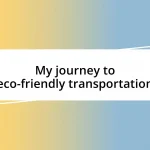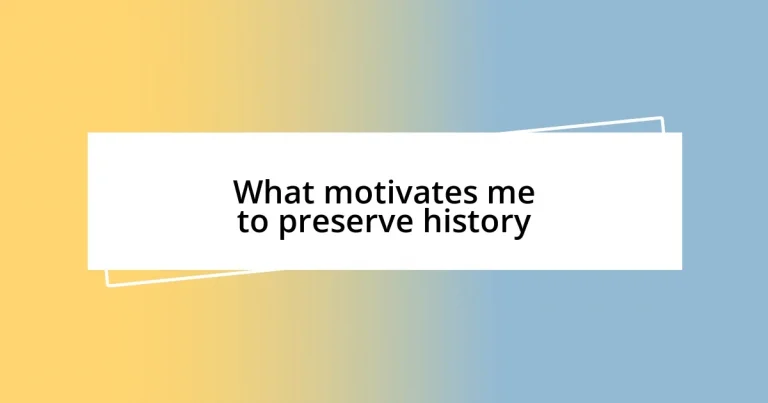Key takeaways:
- History serves as a crucial link to personal and collective identities, fostering a sense of belonging and responsibility towards preserving ancestral stories and lessons.
- Engaging with community preservation efforts enhances connections among individuals and reveals hidden narratives that strengthen local heritage and unity.
- Sharing historical knowledge not only empowers individuals but also cultivates critical thinking, enabling communities to learn from the past and shape a better future.
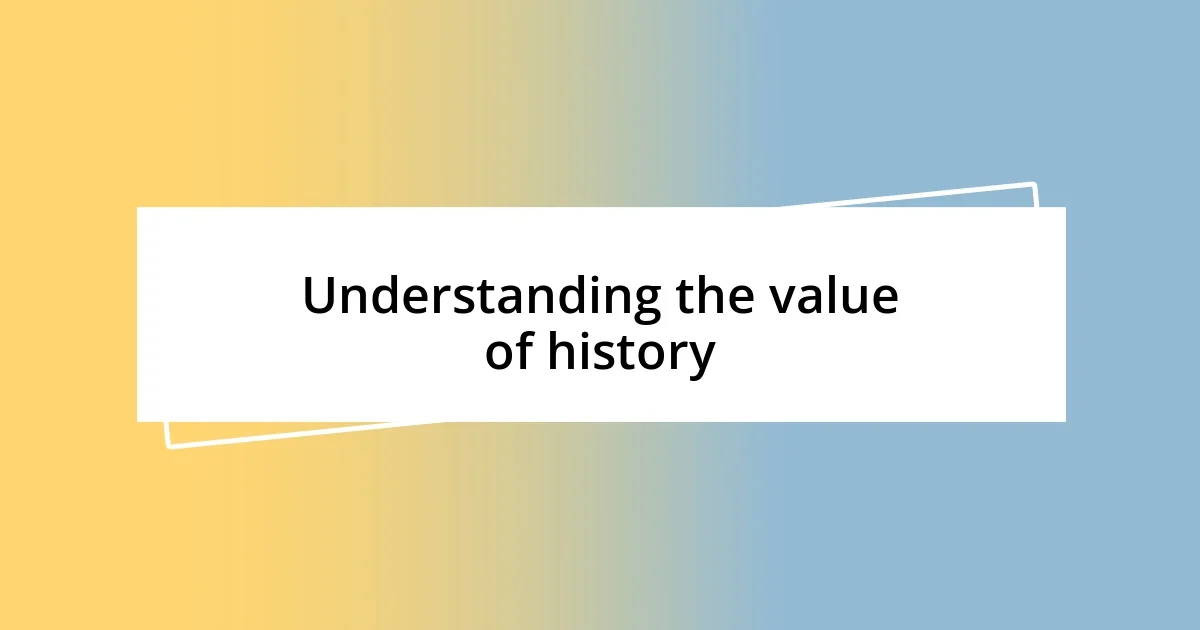
Understanding the value of history
History holds a profound value, serving as a mirror to our past and guiding our present. I remember exploring my grandfather’s old photographs, each image told a story—of love, struggle, and triumph. How can we truly appreciate where we are if we don’t understand where we’ve been?
Reflecting on the lessons of history often sparks an emotional connection within me. For instance, visiting a local museum and seeing artifacts from my community’s past made me realize that these objects are not just relics; they are tangible links to the struggles and achievements of those who came before us. Have you ever felt a connection to a place simply because of its historical significance?
Understanding history fosters a sense of identity and belonging. When I learned about the trials of my ancestors who fought for their rights, I felt a surge of pride and responsibility to continue their legacy. Can we ignore the importance of these stories that shape not only our personal identities but also our collective future? It’s vital to recognize that history isn’t just a record—it’s the foundation on which we build our lives today.
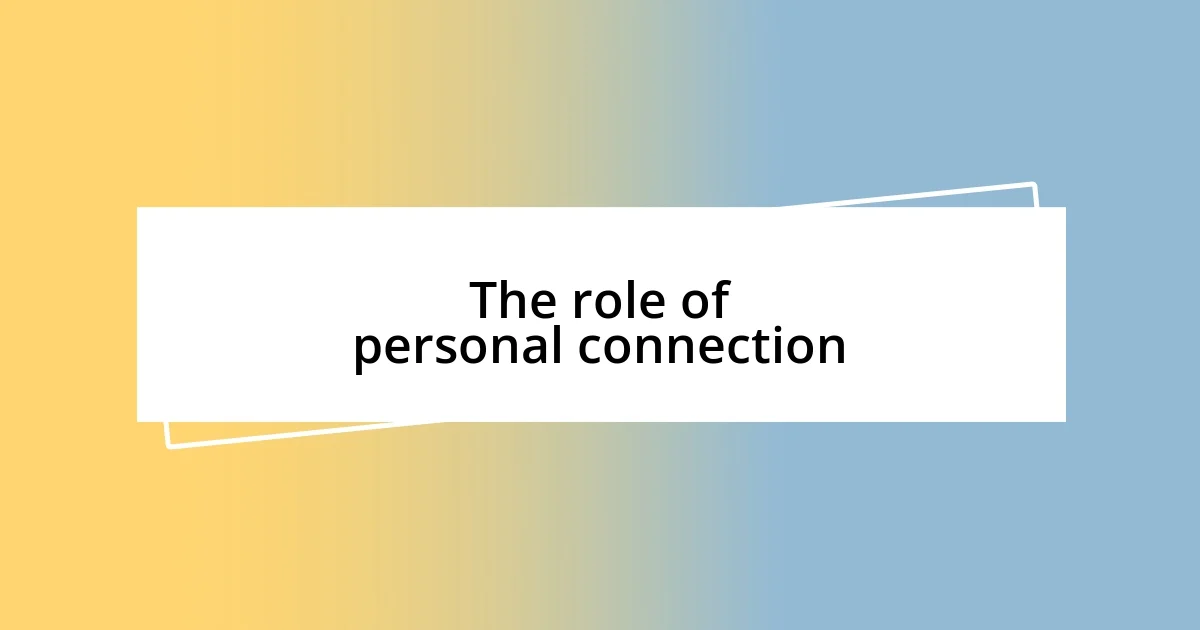
The role of personal connection
Personal connections to history often emerge from family stories passed down through generations. I still recall the day my mother shared her childhood memories of growing up in a war-torn city. As she spoke, I could almost hear the echoes of her laughter and the weight of her struggles. Those narratives ignite a fire within me, compelling me to preserve not just facts, but the emotions attached to those moments.
The significance of personal connections can be distilled into a few key points:
- Emotional Resonance: Personal stories evoke strong feelings that reinforce our understanding of historical events.
- Cultural Identity: Our family histories shape our cultural identities, providing us with a sense of belonging that motivates preservation.
- Legacy: Knowing that I carry the stories of my ancestors drives me to ensure that their experiences are remembered and honored.
When I visit historical sites, I often find myself reflecting on how those places relate to my own story—each visit deepens my appreciation for the sacrifices made and the triumphs achieved. This connection transforms history from a mere subject into a very personal journey, one that I believe is worth preserving for future generations.
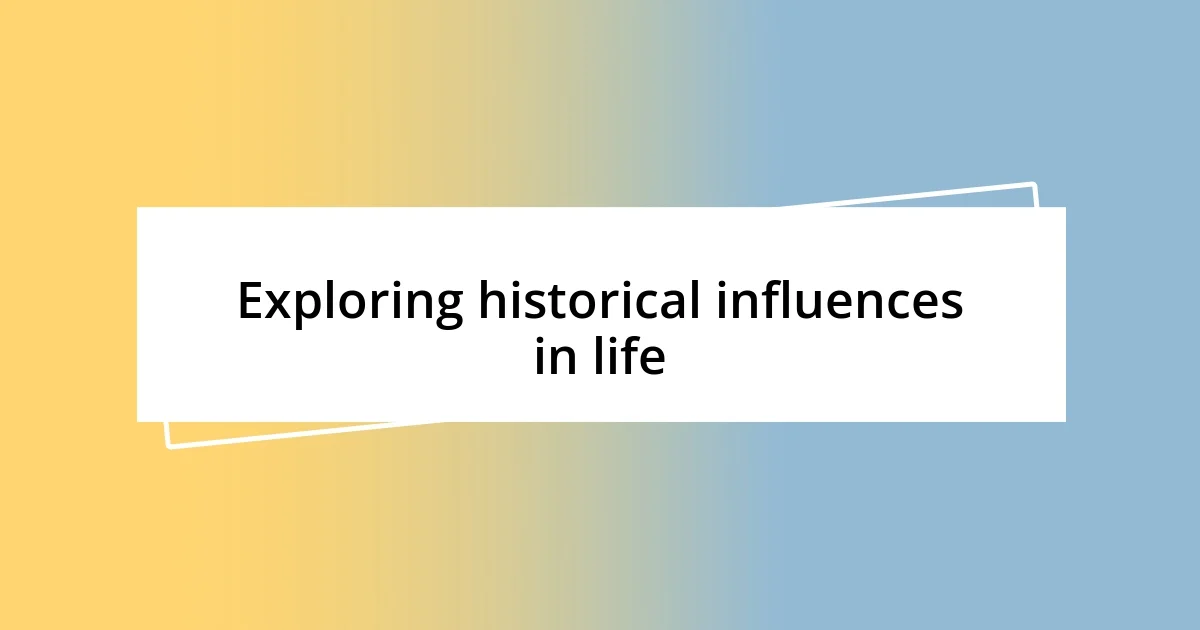
Exploring historical influences in life
Experiencing history isn’t always about grand events; sometimes, it’s found in the little things. I remember the first time I stumbled upon my great-grandmother’s recipe box. The yellowed index cards were more than just ingredients; they were a glimpse into her life, her culture, and the love she poured into her family meals. It made me realize how our everyday practices and traditions are connected to the past, urging me to hold onto them as a way to honor those who came before me.
Delving into historical influences in my life has led me to explore places that resonate with my heritage. A few summers ago, I visited a small village where my ancestors lived generations ago. Walking the same cobblestone streets that they once walked ignited a sense of belonging and continuity within me. I couldn’t help but think—what stories did these walls witness? This experience heightened my awareness of how history is woven into the very fabric of our lives, compelling me to share these stories so that they’re never forgotten.
Comparing the impact of historical influences can be quite enlightening, as it reveals the various ways history shapes our identities. I often reflect on how distinct experiences—like a family heirloom or a pilgrimage to ancestral homelands—can leave indelible marks on our consciousness. The treasures of our past aren’t just artifacts; they serve as reminders that our stories matter.
| Influence Type | Impact on Life |
|---|---|
| Family Stories | Emotional connection; understanding of heritage |
| Artifacts | Tangible links to personal and collective history |
| Site Visits | Sense of belonging and identity reinforcement |
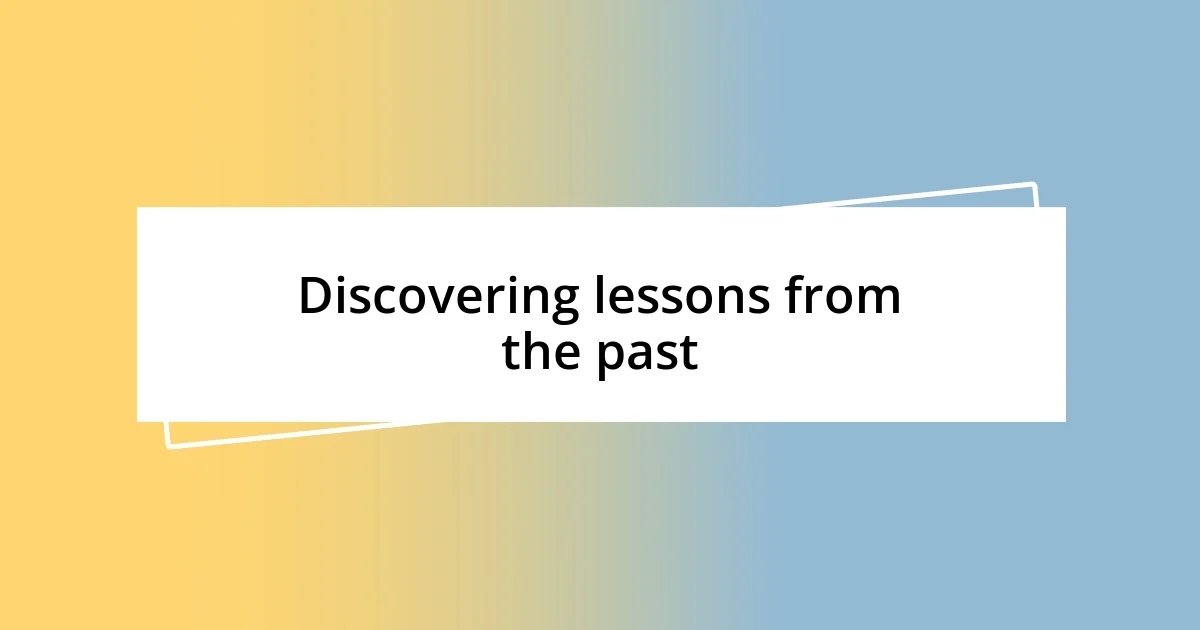
Discovering lessons from the past
I find that history is not just a collection of dates and events; it’s a treasure trove of lessons waiting to be uncovered. For instance, I remember learning about a local community that rallied together after a devastating flood. Their resilience and teamwork opened my eyes to the incredible power of solidarity during tough times. Isn’t it fascinating how these stories of overcoming adversity can inspire us today?
One particular lesson that stands out to me is the importance of understanding our past mistakes. In high school, I read about the repercussions of historical conflicts and how they echo through generations. It was a sobering reminder that neglecting our history could lead to repeating similar errors. That thought stays with me as I navigate the complexities of modern life—isn’t it our responsibility to learn from those who came before us?
Engaging with history often reveals patterns that are surprisingly relevant. I recall attending a lecture on civil rights and feeling a deep connection to the struggles people faced. The speaker highlighted a specific protest that challenged societal norms, reminding us how each generation has the power to incite change. It spurred me to reflect—what causes are we passionate about today, and how will future generations view our efforts? These reflections motivate me to delve deeper into history, discovering lessons that shape not just who we are, but who we aspire to be.
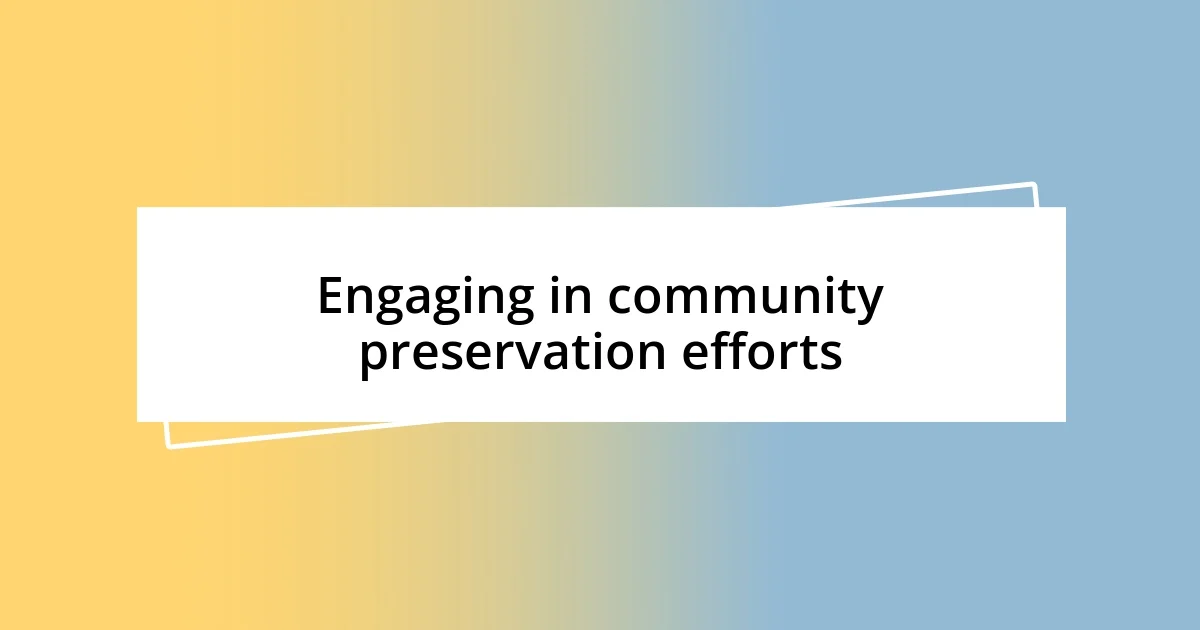
Engaging in community preservation efforts
Engaging in community preservation efforts isn’t just about keeping landmarks intact; it’s about fostering connections with the people around us. I remember volunteering for a local historical society where we organized a neighborhood walking tour. It was incredible to see residents, some who had lived in the area for decades, share their stories about the houses and streets that meant so much to them. Their laughter and reminiscences made me realize how shared history can strengthen community bonds.
What strikes me most about community efforts is the chance to learn from each other. A few months ago, I participated in a restoration project for a decrepit old theater. As we scraped the peeling paint and cleaned the dusty corners, I chatted with older volunteers who recounted memories of watching films there as children. Their stories revealed layers of history I had never known, making me think—how many hidden narratives do our local places hold? Engaging in these activities has taught me that preserving history is not a solitary endeavor; it thrives on collaboration among community members who share a common goal.
I’ve also found that community preservation efforts ignite a true passion for local history. One Saturday, I helped organize an exhibition featuring photographs from decades past, and witnessing the joy on people’s faces as they recognized their younger selves sparked something in me. Each image held a story, and it was rewarding to connect those narratives with present-day life. Isn’t it remarkable how past and present intertwine, reminding us that we are part of an ongoing story? Through these efforts, I feel a sense of purpose, knowing I contribute to the preservation of our shared legacy for future generations.
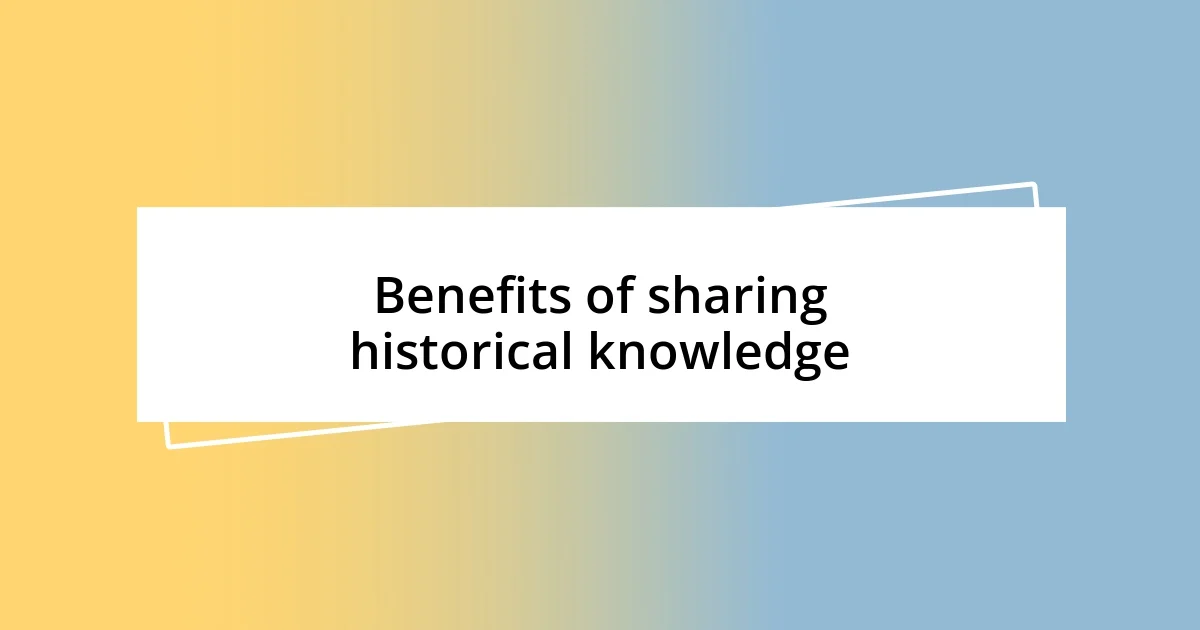
Benefits of sharing historical knowledge
Sharing historical knowledge offers invaluable benefits that extend far beyond dusty books. I remember the excitement I felt when I shared stories about my grandmother’s experiences during World War II with my friends. Their eyes lit up, and we quickly dove into discussions about courage and resilience. It was a powerful reminder that personal narratives can breathe life into history, making it relatable. Who would have thought that a single tale could spark such deep conversations?
Moreover, I’ve seen firsthand how sharing history fosters a sense of identity within communities. Just last year, I participated in a local history fair, where I had the privilege of presenting artifacts from our town’s past. Watching families gather around our booth, sharing their connections to the items displayed, made me appreciate how history can unify us. It’s not just about what happened; it’s about who we are and where we come from. Can sharing these stories help us understand differing perspectives in our communities?
Finally, I believe that sharing historical knowledge acts as a catalyst for learning and critical thinking. During a recent discussion group on civil rights history, we analyzed how past injustices inform today’s societal challenges. Engaging with others in this manner not only deepened my understanding but also motivated everyone to think critically about our responsibility in the present. It made me wonder—how can we use these insights to pave the way for a better future? Sharing history isn’t just about preservation; it’s about empowering ourselves to effect positive change.
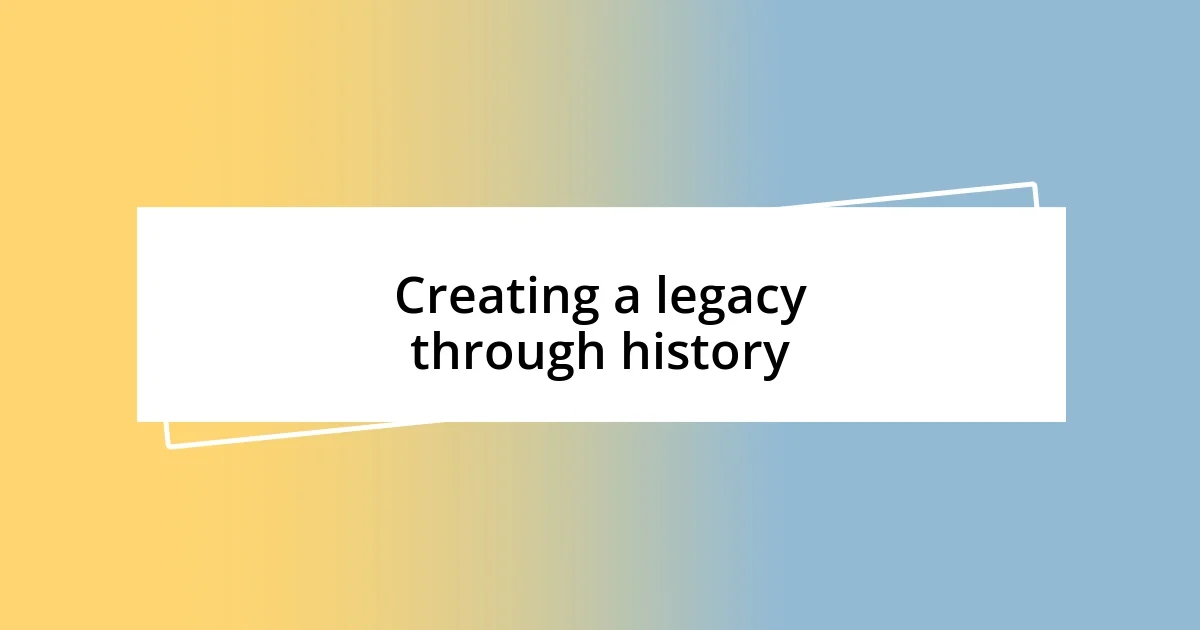
Creating a legacy through history
Creating a legacy through history is about more than safeguarding relics; it’s also about forging connections with our past that inspire future generations. I often think about the time I attended a storytelling event at a local museum. As we gathered around, a woman shared a poignant tale of her family’s journey during the Great Migration. Listening to her recount the sacrifices and dreams of her ancestors didn’t just fill me with admiration; it made history come alive in a personal way. How many of us can say we carry stories that deserve to be told?
In my own experience, I realized that documenting our history can have profound implications for building a legacy. Last fall, I partnered with a group of students to create a digital archive of oral histories from our neighborhood’s elders. As we conducted interviews, I felt a sense of urgency to capture those voices before they were lost. Each interview revealed a piece of our community’s puzzle—stories of resilience, joy, and challenge that shaped who we are today. Isn’t it fascinating how the past can guide us in addressing current realities?
Preserving history isn’t merely about creating records; it’s about leaving a footprint in the sands of time for those who follow. In one inspiring moment, I led a workshop where participants crafted time capsules to be opened years later, filled with personal letters, photographs, and mementos. Watching their excitement as they chose what to include struck a chord with me. They were not only creating a container of memories but also a legacy of their identities for future explorers. I couldn’t help but wonder—what stories will resonate with those who discover them, and how will they see themselves reflected in our shared history?









